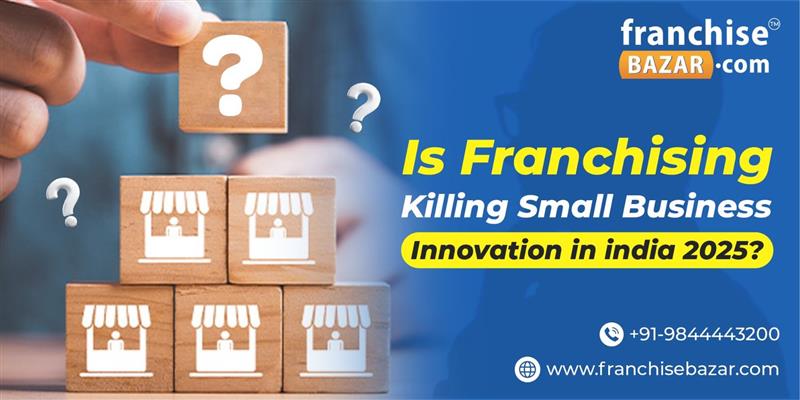Is Franchising Killing Small Business Innovation in india 2025?

Written By: Gouri Ghosh
Walk through any Indian street today, and you see the same names repeating themselves over and over—large coffee outlets, branded beauty parlors, and chain gyms. But where did the local tea stall, the neighborhood bookstore, or that little store you would cherish? What was previously a business model largely exclusive to multinational fast-food companies now turns out to be a standard path for entrepreneurs all over the country. From coffee shops on each corner to preschool chains, wellness centers, co-working spaces, and fitness studios, a franchise has become a trend that has turned into a tsunami. Now, almost every big urban and semi-urban market has its fair share of franchise units, and this wave is now spreading into Tier 2 and Tier 3 cities. So is franchise killing small business segments in India?
Franchise and Small Business: Friends or Enemies?
Let's get an idea of what we're comparing before we go further.
You're duplicating a tried formula, trading under their name, products, and business model.
Think of brands like McDonald’s, Domino’s, or Diagnostics.
On the other hand, a small business or startup usually begins from scratch—your idea, your brand, your rules, and of course, your risk.
- Franchise = A ready-to-eat meal
- Small Business = Cooking your own recipe from scratch
Both approaches can be successful, but they work in very different ways.
Here’s a quick comparison:
Franchise:
- Easier to start
- Lower risk
- Established brand recognition
- Limited creative freedom
Small Business / Startup:
- Total control and freedom
- Increased risk and accountability
- Involves creating everything from scratch
- More space for innovation
The Rise of Franchising in India (2020–2025)
Let's face it—the franchise business in India has registered tremendous growth between 2020 and 2025.
Franchising Trends: 2020 to 2025
- Year-on-Year Growth Rate: The Indian franchise business has been expanding at 30–35% annually, placing it among the fastest-growing franchise markets globally.
- Economic Impact: The industry is forecast to contribute close to 5% of India's GDP by 2025, from approximately 1.8% in 2020.
- Market Value: The overall size of the Indian franchise industry will grow to INR 10 lakh crore (approximately $120 billion) by 2025 end.
- Employment Generation: The sector has generated over 15 million jobs, with additional ones expected in Tier 2 and Tier 3 cities.
Sector-Wise Growth:
- EdTech — Franchised preschools and skill-development centres
- Retail & Fashion – Apparel, electronics, and lifestyle brands tapping regional markets
Why does franchising seem so attractive?
You receive:
Franchise Pros:
- Instant brand recognition: When you launch a franchise outlet, consumers already understand what to expect. Take McDonald's or Domino's, for instance. People will have faith in the quality and service even before entering. This saves you the time and money that would otherwise be spent on marketing and establishing customer faith.
- Lower risk: Franchises have tested their business models over the years, so they’ve already figured out what works. That means you’re less likely to fail compared to starting a completely new business where everything is uncertain.
- Strong support system: Franchisors usually provide extensive training, operations manuals, marketing help, and ongoing support. This can be a huge help if you’re new to running a business or don’t have expertise in certain areas.
- Quicker setup and operations: It's all mapped out from supplier relationships to menu design to store layout.
- Easier loan access: Banks and investors feel safer lending to franchises because the business model is tried and true and can be replicated.
Franchise Cons:
- Limited creative control: You're bound by strict guidelines laid out by the franchisor. Want to introduce a new product? Modify the decor? Modify the marketing approach? Too often, that's not permitted. You're operating their brand, not yours.
- Innovation is not encouraged: Because franchises are all about replicating the same customer experience, taking chances on new ideas or regional adaptation is not usually an option.
- Less personal identity: You belong to a bigger brand, and customers do not perceive you as an individual entrepreneur but as one among many outlets.
Small Business / Startup Pros:
- Full control and freedom: Every decision from your product to your marketing to your pricing is yours. If you have a new idea or see a local market need, you can act on it immediately.
- Greater opportunity for innovation: Small businesses can create new products, offer personalized customer experiences, or adapt quickly to market changes. This is where many of the most exciting new ideas come from.
- Creating a personal brand: Customers tend to form a loyal relationship with local businesses as they tend to feel more personal and genuine.
- No royalty payments: You retain all your profits.
Small Business / Startup Cons:
- Higher risk: Since you are beginning from scratch, you lack the security net of a proven system. You could struggle with acquiring customers, supplier relationships, or running the business on your own.
- Takes longer to build brand and trust: It may take years to acquire customer loyalty and acceptance, and you will spend considerable time and finances on marketing.
- You're on your own: You don't have the support of a large company behind you with training or continuous support as you do with franchisees.
- Harder access to funding: Banks and investors might be loath to fund an untested business model or an untested brand.
Franchise vs Startup: Which Should You Choose?
If you're considering opening up a business in India today, you're likely asking yourself whether to do a franchise or begin a startup from ground zero.
Here's our simple advice:
Opt for a franchise business if:
You prefer a systematic way with a well-defined path to take. You need urgency in establishing and like to have a lower-risk route where most of the hurdles have already been worked out by someone else. Franchises provide you with brand identity and assistance, which can ease the ride.
Select your own startup if:
You're enthusiastic about your concepts and excited to be innovative. You desire freedom to come up with something new and unique, even if it involves greater risk-taking. If you enjoy creating solutions, testing new things, and establishing a distinct brand, a startup could be for you.
Why Franchise Business Is Good, But Not Always Enough
There's no question that franchise companies have a lot of benefits, particularly if you're a neophyte at business or prefer an easier route to success. The following are the reasons why franchising could be a wonderful option:
- Training and Mentorship: The majority of franchisors offer comprehensive training programs as well as regular mentorship. That way, you don't have to learn everything by yourself—you are helped by individuals who've been in your shoes before.
- Access to Proven Systems: Franchises include proven systems of operation. From inventory management to marketing, you work from a plan that's been tried and tested. This minimizes guesswork and error.
- Brand Power: When you become a franchise, you're tapping into a brand that consumers already recognize and trust. That means you don't need to work for years establishing your reputation from ground zero.
- Easier Financing: Investors and banks tend to be more interested in financing franchises since the system is less volatile and more predictable than that of startups.
But the catch is this: franchising is not for everyone.
- If you've got a revolutionary concept that you think has the power to shake up the market, then franchising will feel too constricting.
- If you truly comprehend the needs of your local community, then perhaps you will desire the flexibility to customize your business in ways a franchise will not permit.
- Franchises often demand that you adhere to very rigid rules and standards, with little leeway for significant changes or innovation.
- If you have an intense passion to innovate, try, and risk things in order to make something unique, then beginning your own business is perhaps a better option.
- While it's harder and riskier to become an entrepreneur, it's also where innovation and breakthroughs occur.
Conclusion:
So is franchising stifling small business innovation in India?
Not really. But if we only depend on franchising, we may be depriving ourselves of our future.
We think India requires both—a robust franchise industry and a rich small business ecosystem. Innovation flourishes when there is space for new voices, new ideas, and homegrown talent.
As we make our way further into 2025, the actual question isn't "Franchise vs small business?" It's: "How do we balance both to build a smarter, more creative economy?
Disclaimer: The brands mentioned in this blog are the recommendations provided by the author. FranchiseBAZAR does not claim to work with these brands / represent them / or are associated with them in any manner. Investors and prospective franchisees are to do their own due diligence before investing in any franchise business at their own risk and discretion. FranchiseBAZAR or its Directors disclaim any liability or risks arising out of any transactions that may take place due to the information provided in this blog.
Recent Blogs

Written By: Harsh Vardhan Singh
So, before making...

Written By: Khushboo Verma
Chennai...

Written By: Gouri Ghosh
In India, numerous entrepreneurs...

Written By: Bandana Gupta
India’s service...
Why Should I Register?
You are seeking to access information which is provided only to registered members. It takes less than a minute to register and access information on FRANCHISEBAZAR.